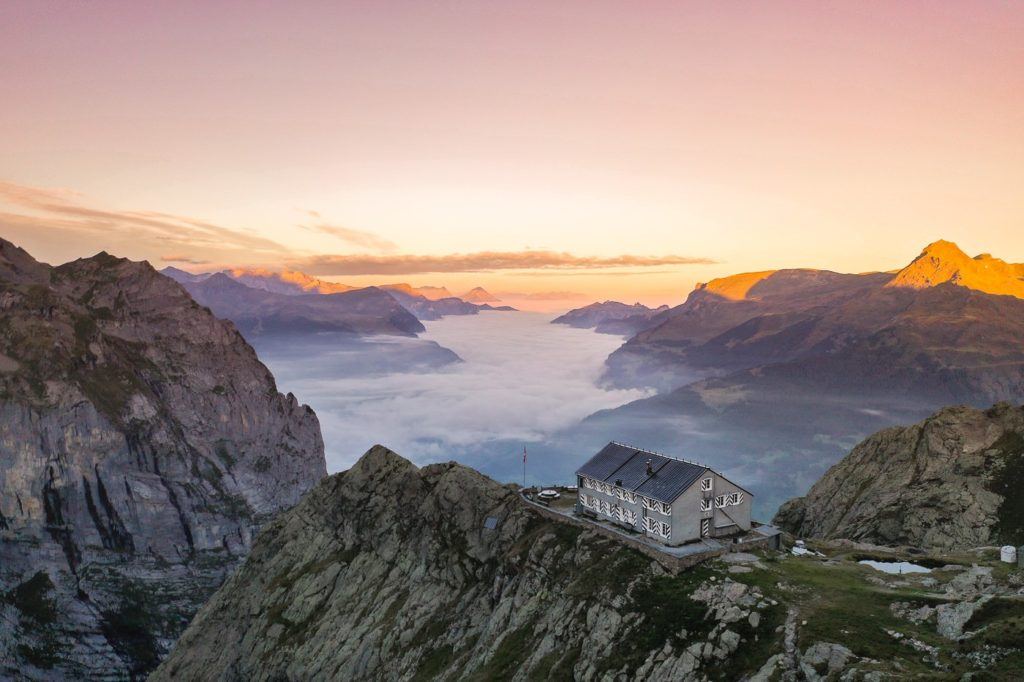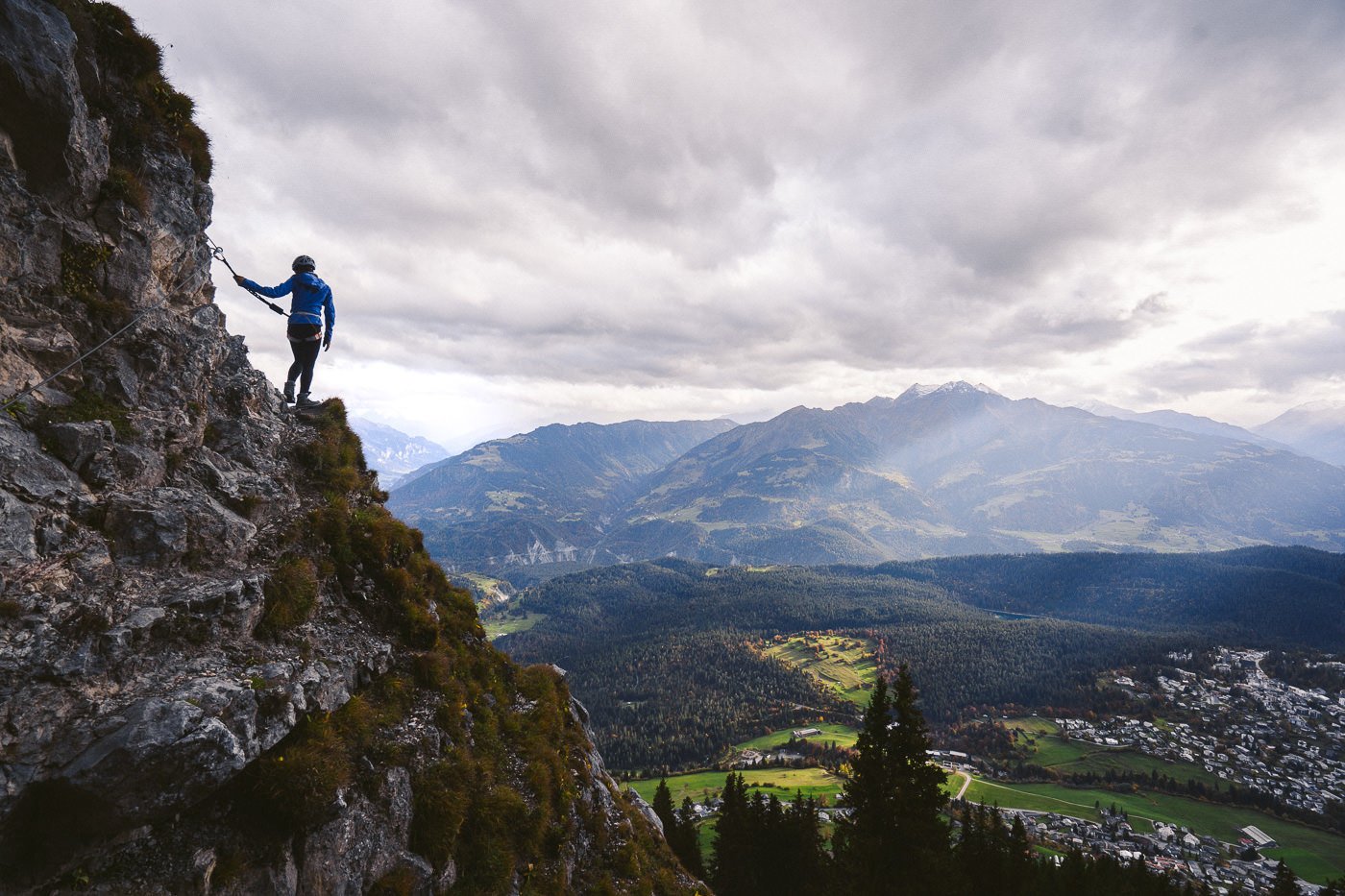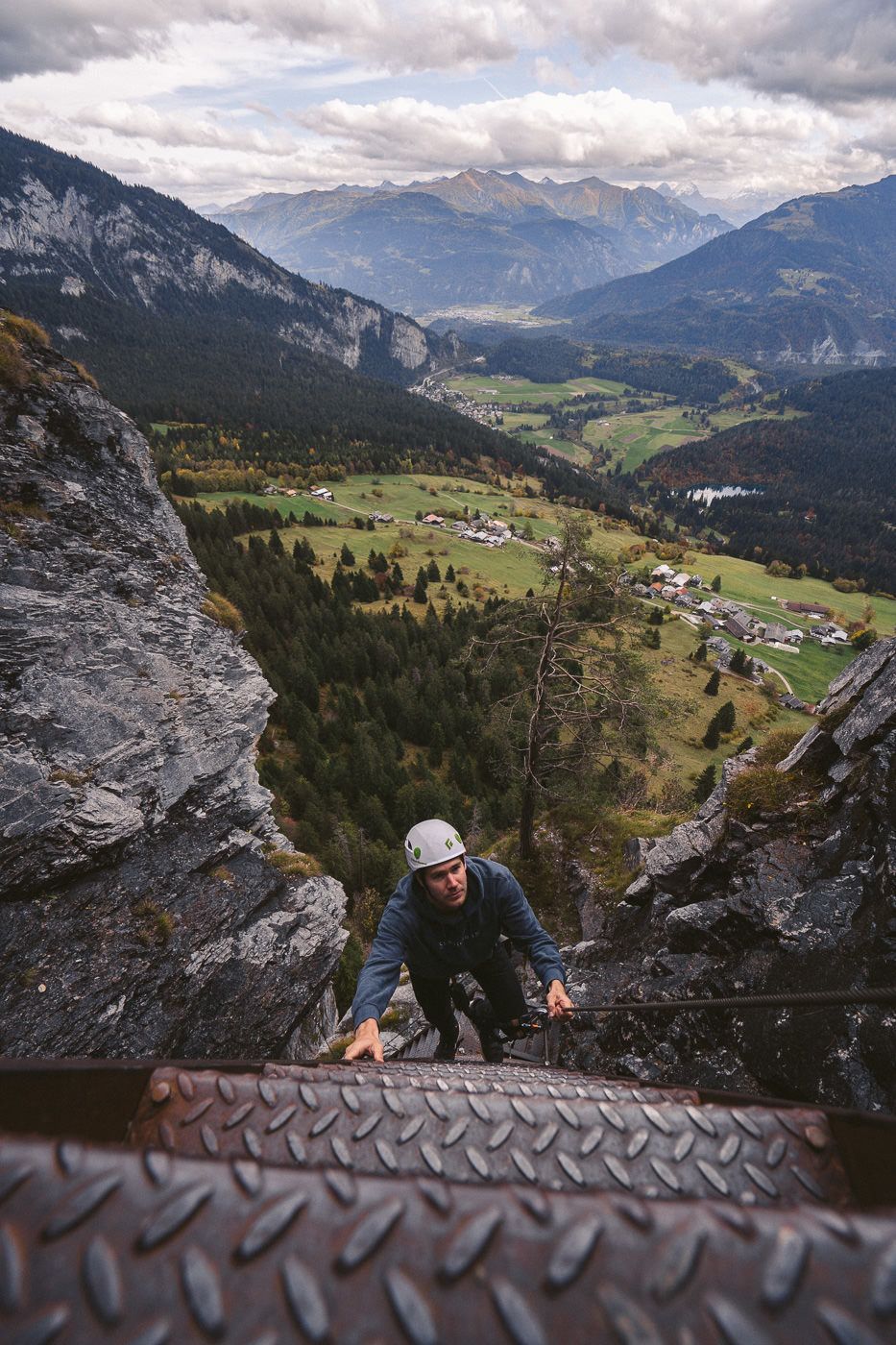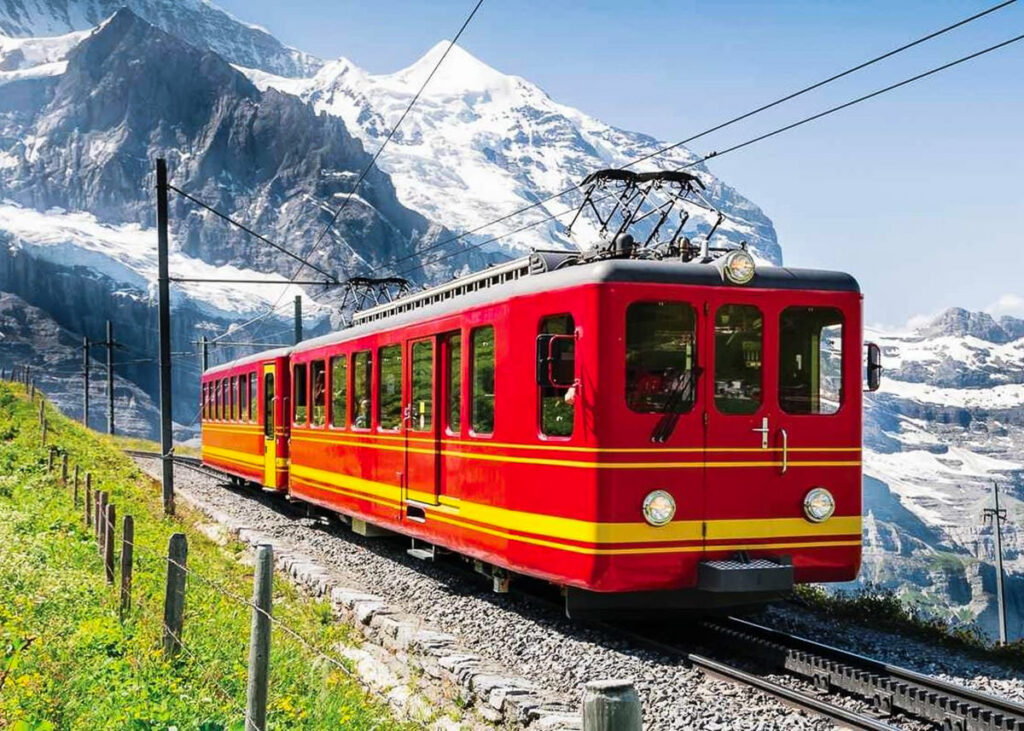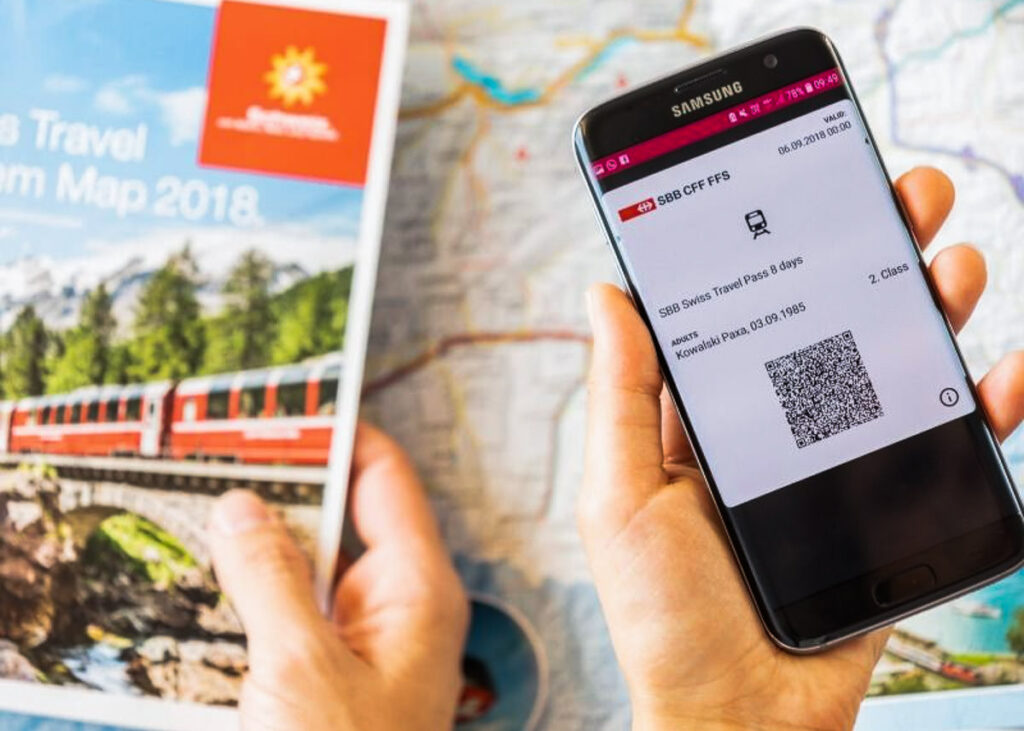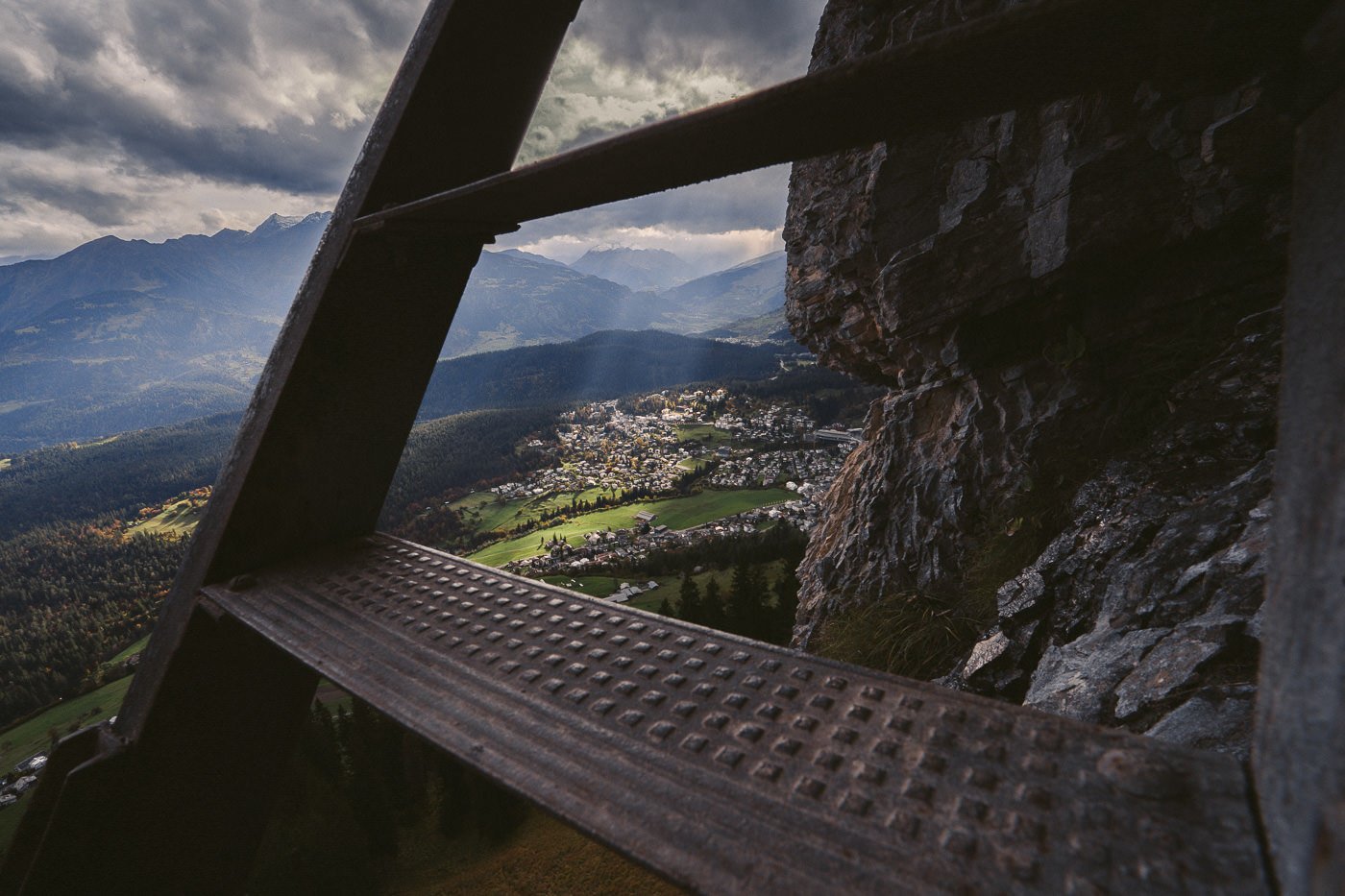The Via Ferrata (Klettersteig) in Flims is an epic series of staircases and ladders on the edge of a cliff that winds up hundreds of meters above the valley. From the summit, you have incredible views of Crestasee, Caumasee, and the entire region of Flims
YOU WILL LIKE THIS POST-ASWELL: 4 AWESOME VIA FERRATA ROUTES IN SWITZERLAND
WHAT IS A VIA FERRATA
A Via Ferrata, Italian for “Iron Path,” is a protected climbing route found primarily in the Alps, but now can be encountered all over the world. The concept was first developed in Italy during World War I to facilitate troop movement across the rugged Dolomite mountain range. Today, they provide adventurous outdoor enthusiasts with an exciting way to experience the high alpine environment.
A Via Ferrata consists of a series of iron rungs, pegs, ladders, and cables fixed to the rock, creating a pathway that allows non-expert climbers to traverse steep and difficult terrain that would otherwise require advanced climbing skills. Additionally, there’s a steel cable that runs alongside the route, to which climbers can attach themselves with a special via ferrata harness for safety.
While Via Ferrata routes vary in difficulty, all require a good head for heights, a moderate level of fitness, and some essential equipment, including a helmet, harness, and a special via ferrata kit like this one: Petzl Via Ferrata Kit. They offer a unique way for people to access spectacular mountain landscapes, and enjoy the thrill of rock climbing without the need for extensive training or experience.
There’s an awesome 3-DAY Via Ferrata Tour in Switzerland completely dedicated to via ferrata. It takes you on a new and challenging via ferrata each day and includes all accommodation, gear, food UIAGM Guides and transport throughout the trip. You can Click Here to check out the details of that tour.
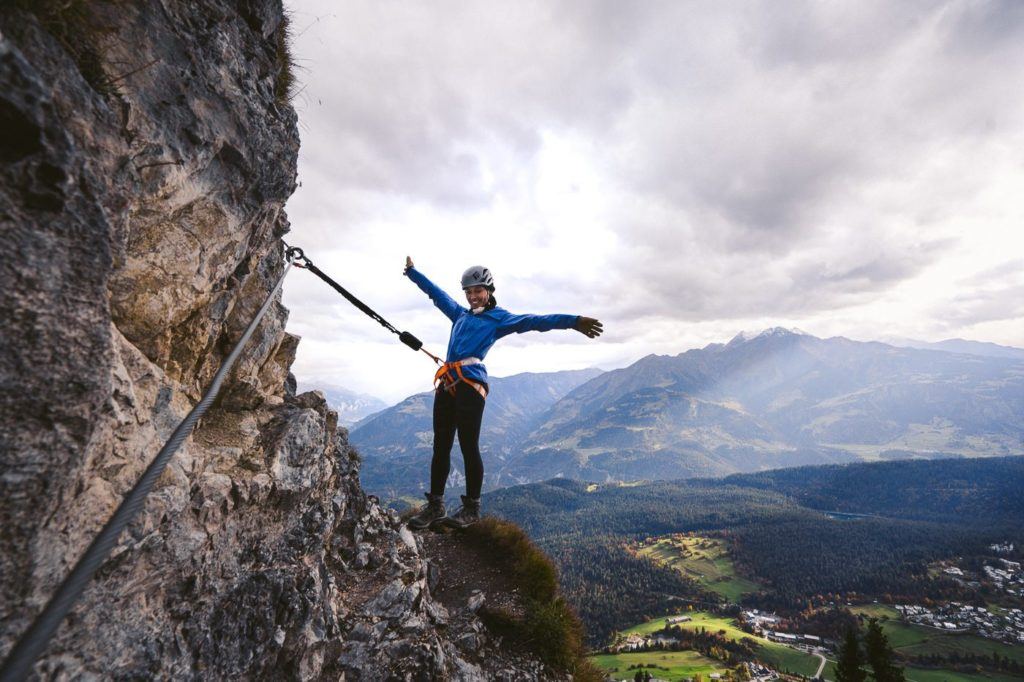
HOW TO GET TO THE PINUT VIA FERRATA IN FLIMS
The Pinut Via Ferrata is quite manageable with public transport but does require a little bit of pre-planning. First, you will want to catch a bus to Flims (no train station) and get off at Flims, Dorf. This is the bus station that is right next to Laax Rental, where you can rent your Via Ferrata gear.
Once you have your gear, you can catch the “1” bus to Fidaz, Pinut. It is 7 stops from Flims, Dorf, and takes 13 minutes. Once you get off at the bus stop, you will have a 1.8km hike up the trail to the start of the Pinut Via Ferrat where you will clip into the cable for the first time.
Be warned that the bus only comes once an hour (at least the day I visited) so we decided to walk the 2.7 km from Flims, Dorf to the Fidaz, Pinut stop and it only took about 30 minutes.
If you have the Swiss Half-Card you will receive a huge discount on your tickets. I bought mine when I arrived in Switzerland and it has saved me over a thousand dollars throughout my trip.
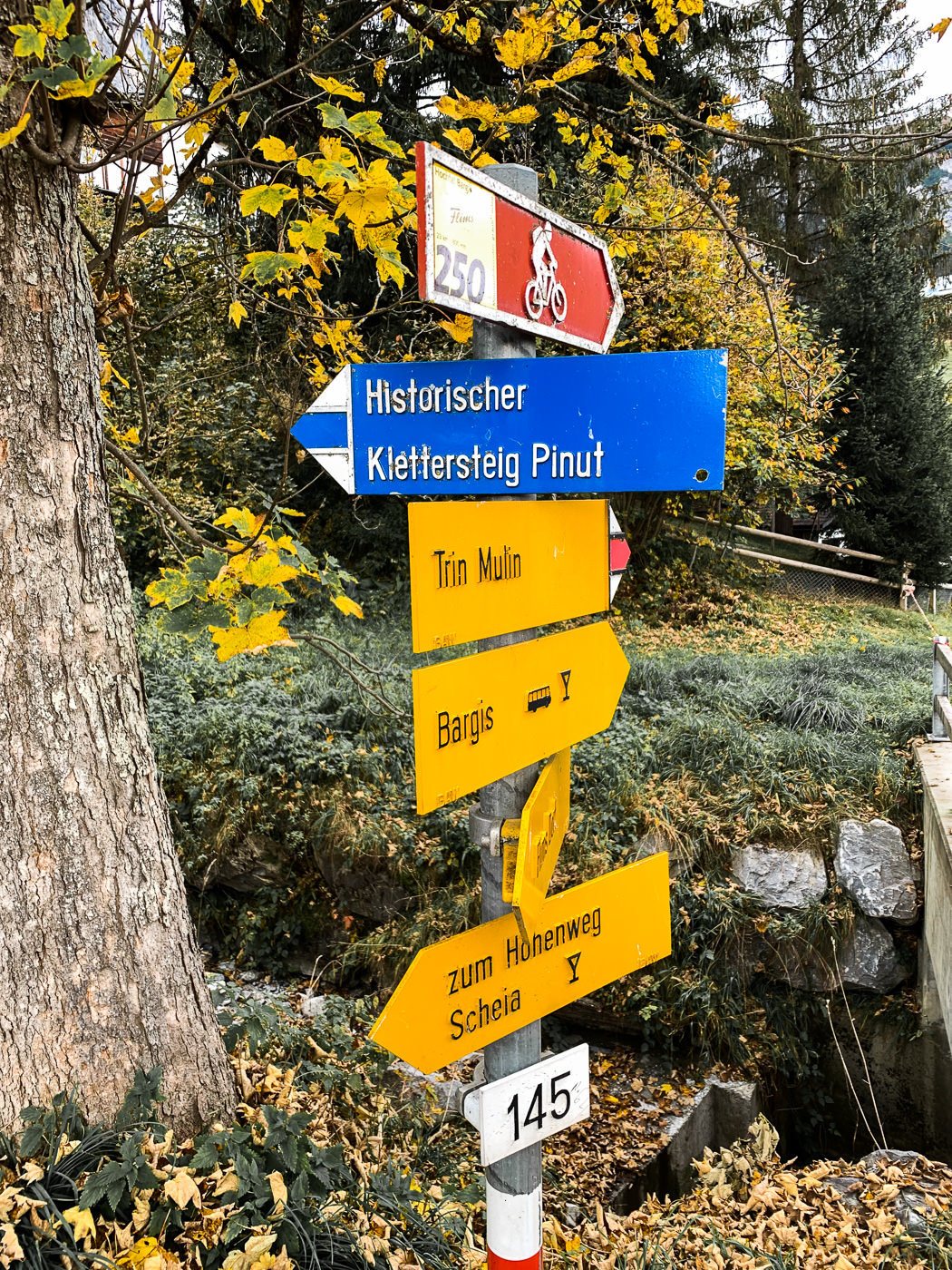
GET A SWISS TRAVEL PASS!
Enjoy UNLIMITED train, boat, and bus rides in Switzerland for up to 15 days. Click to book a flex Swiss Travel Pass or choose the Consecutive Swiss Travel Pass.
The Swiss Travel Pass starts at $260 for 3 days. Click here to check if it’s available on your travel dates.
PINUT VIA FERRATA DETAILS
- Highest point: 2,057m
- Lowest Point: 1,187m
- Distance: 6km total
- Duration: 3-4 hours total
- Ascent: 928m
- Descent: 565m
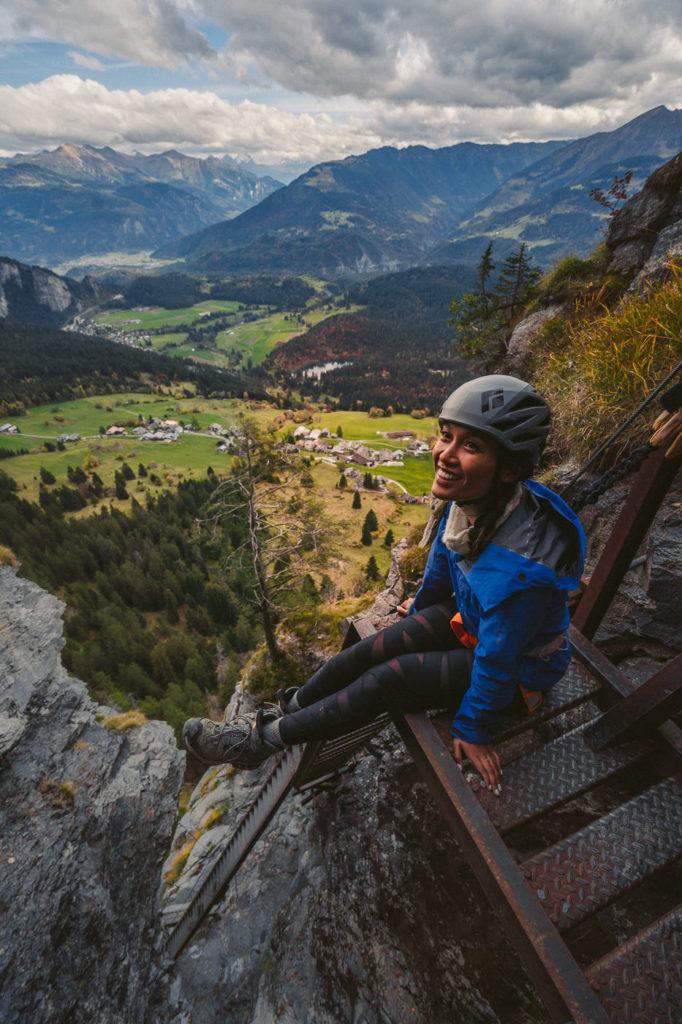
RENTAL GEAR FOR PINUT VIA FERRATA
There are a few stores in Flims that rent out the gear. I rented my gear from LAAX Rental, Talstation Flims. They were right next to the bus stop and everything was spot on. The rental of the helmet, harness, and clips cost me $30. This is a little more expensive than other rentals I’ve had on Via Ferrata gear in Switzerland but only $5-10 more.
I’ve added the other stores below that rent out gear and their phone numbers. You can also call the stores and check the weather conditions and ask other questions as they are experts on the Pinut Via Ferrata trail.
- Guest information, Flims +41 (0)81 920 92 00
- Sport Beat, Flims +41 (0)81 911 33 21
- LAAX Rental, Talstation Flims +41 (0)81 927 70 77
- Mountain Fantasy, Flims +41 (0)81 936 70 77
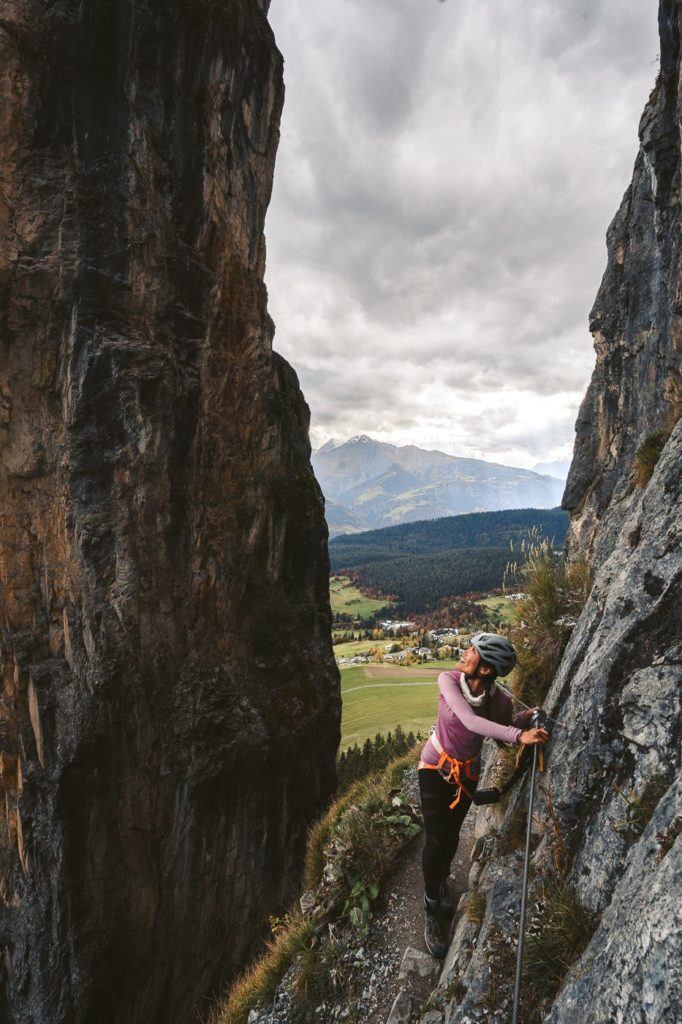
DO YOU NEED EQUIPMENT
You can actually buy your own Via Ferrata gear for pretty cheap on sites like Amazon and then you don’t need to rent it at each Via Ferrata course. They usually cost about $20-40 USD to rent per day and can be bought for about $200 for a full kit such as this Petzl Via Ferrata Kit.
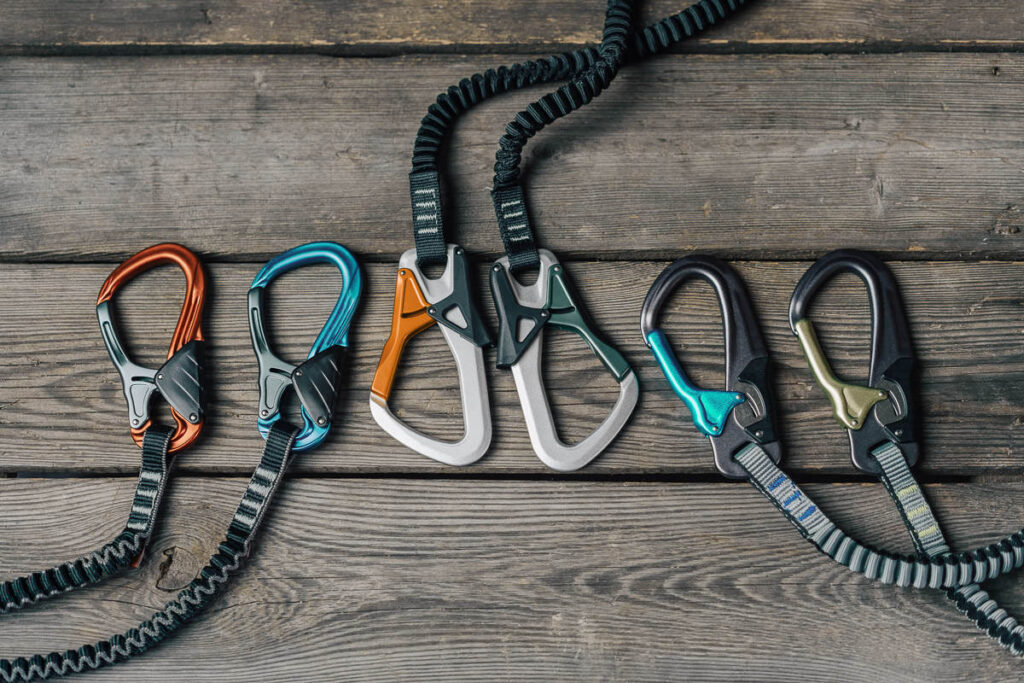

PINUT VIA FERRATA HIKE ASCENT
I followed this exact route, which was suggested by the official tourism board of Laax/Flims. It worked well although we did it quite a bit faster than the recommended times.
| Route | Distance | Ascent | Average Time |
|---|---|---|---|
| Flims Village – Pinut bus stop | 2.2km | 110m | 45min |
| Pinut bus stop – Pinut roping-up area | 1.0km | 200m | 30min |
| Pinut via ferrata – Servetsch Pinut | 1.7km | 700m | 2h 20min |
PINUT VIA FERRATA HIKE DESCENT
Below is the route suggested by the tourism board of Laax/Flims
| Route | Distance | Descent | Average Time |
|---|---|---|---|
| Servetsch Pinut – Bargis | 2.7km | 511m | 1h |
| Bargis – Fidaz | 3.7km | 350m | 1h |
| Fidaz – Flims Village | 2.2km | 110m | 35min |
MY EXPERIENCE ON THE PINUT VIA FERRATA IN FLIMS
When I heard about the Pinut Via Ferrata in Flims, I was actually based in Chur at the time. It’s only a 30-minute bus ride from Chur to Flims so I thought it was something I had to go out and do. It turned out to be an epic adventure and overlooked the Crestasee and Caumasee lakes I’d been visiting in the days prior.
I began by catching the bus from Chur to Flims, the Dorf bus stop. We left a little bit late and only got to Flims, Dorf at midday. I’d suggest going earlier so you don’t have to rush because the gear has to be returned by 6 pm. This means the ideal time to start is in the morning.
Luckily, the staff decided to let us rent the gear even though they weren’t stoked we were starting so late. Each set of Via Ferrata gear costs $30, which included a harness, clips, and a helmet.
Unfortunately, our poor planning continued as the bus from Flims, Dorf to Fidaz, Pinut (the start of the route) was going to be another 50 minutes. We decided to power-walk to the starting point at Fidaz, Pinut and it took us just over 30 minutes to walk the 2.7 km up the hill. At this point, we saw the blue and white ‘Klettersteig Pinut’, sign on the left (pictured above).
We then turned left off the road and begin the 1.5-kilometer steep walk to the starting point of the Via Ferrata. The entire incline of the hike is just under 1000m of ascent so be ready for some steep forest sections as well as the stair and ladder climbing.
The Pinut Via Ferrata is actually the oldest of it’s kind in all of Switzerland and was opened in 1907. For those who are nervous hearing about climbing a century-old ladder, fear not. This Via Ferrata is maintained by the tourism board and was fully renovated in 2007.
The first part of the Pinut Via Ferrata is, in my opinion, the most spectacular. There is a huge spire that you pass by on the boardwalks in between scaling the ladders up the cliffside. It is a really unique rock formation and by walking up on the cliffside you get a close-up inspection.
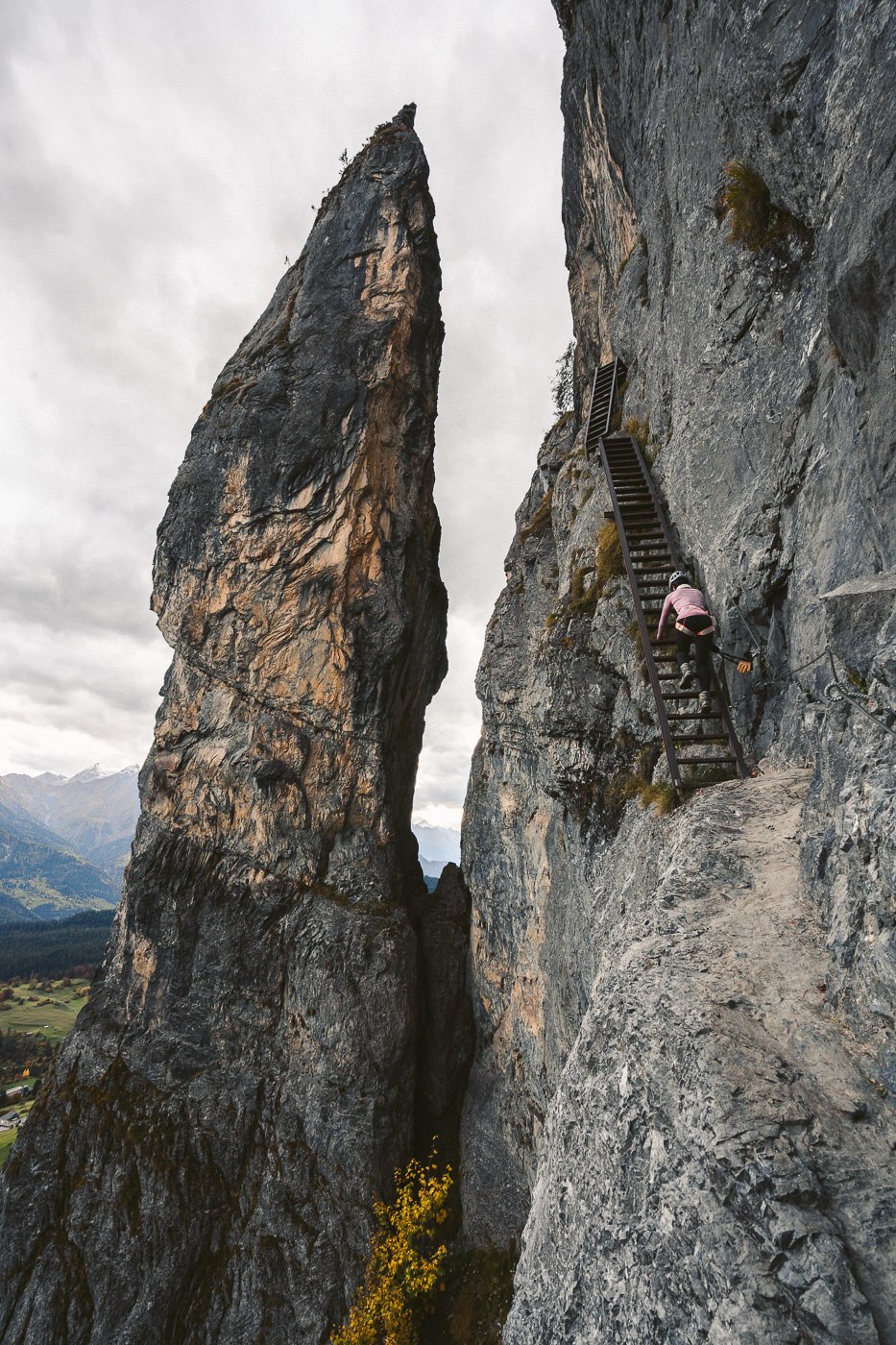
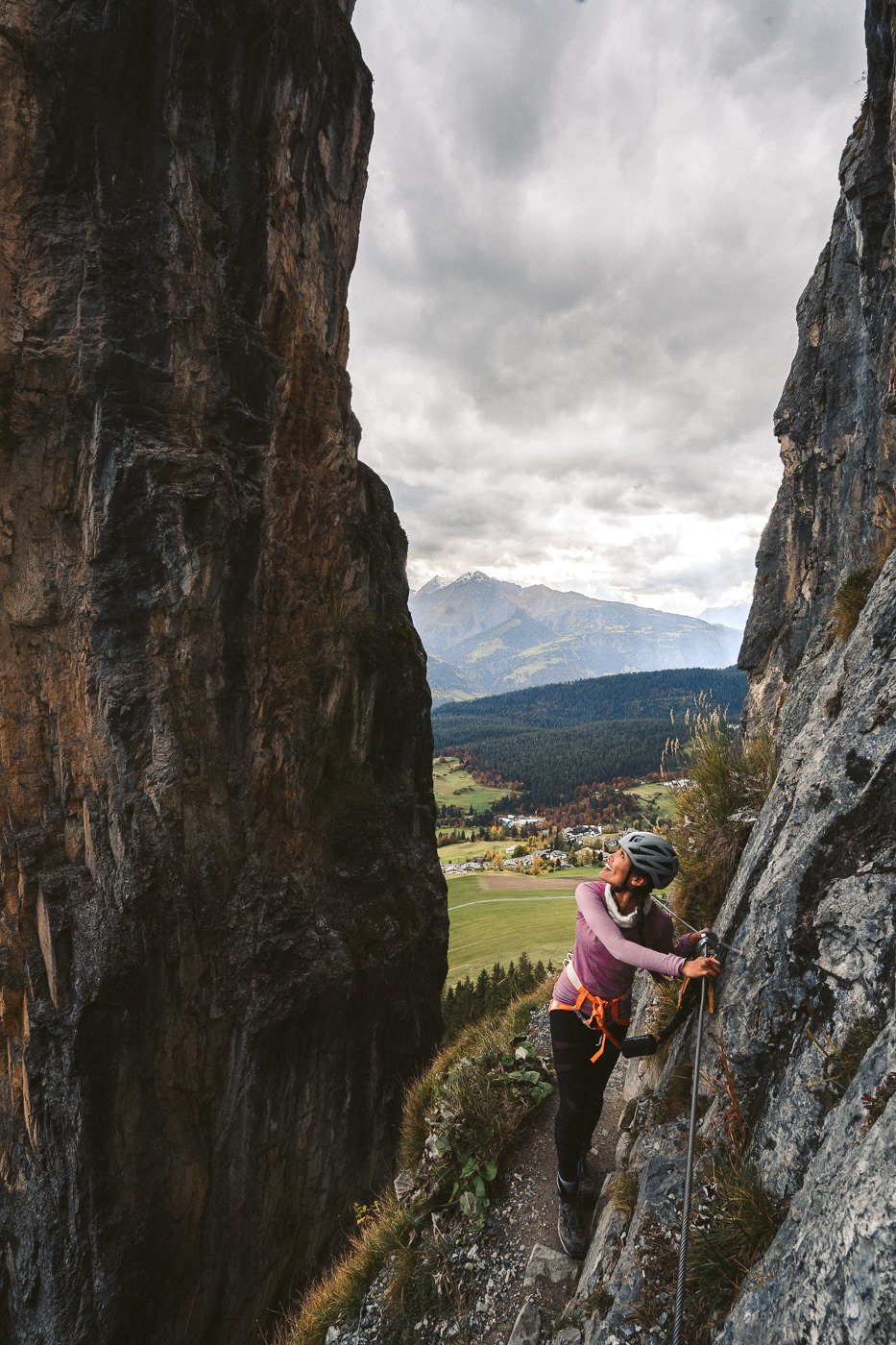
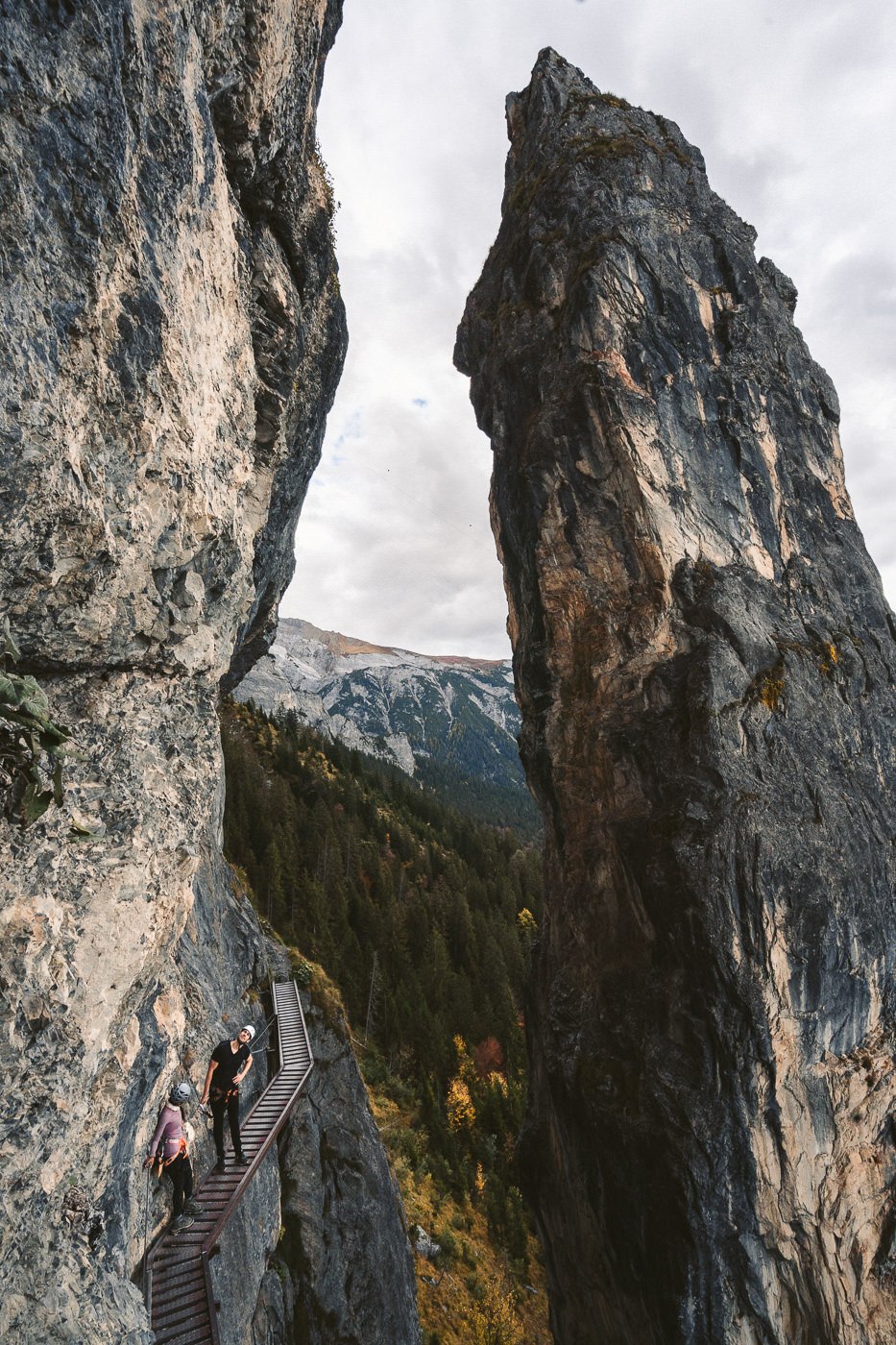
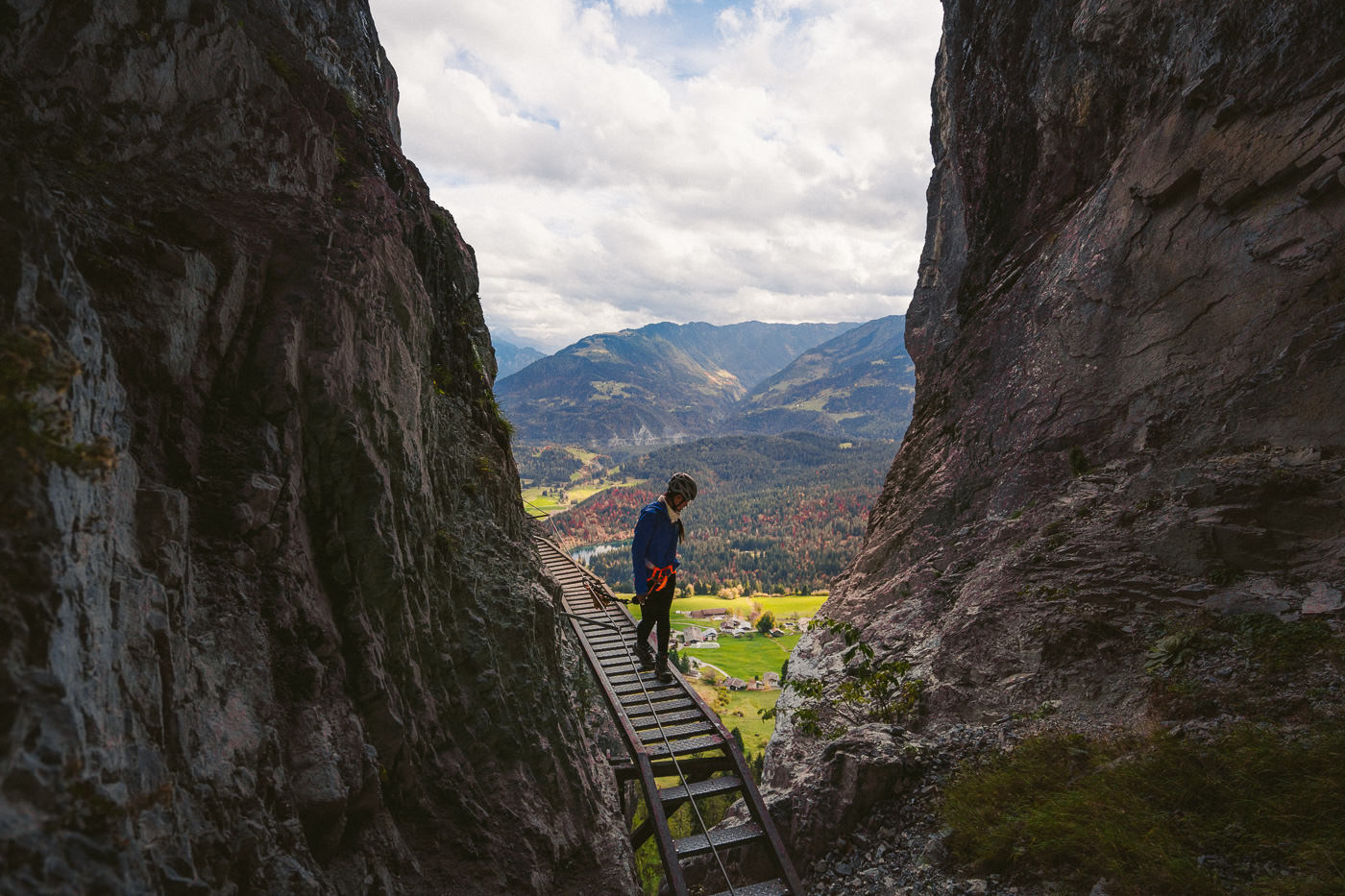
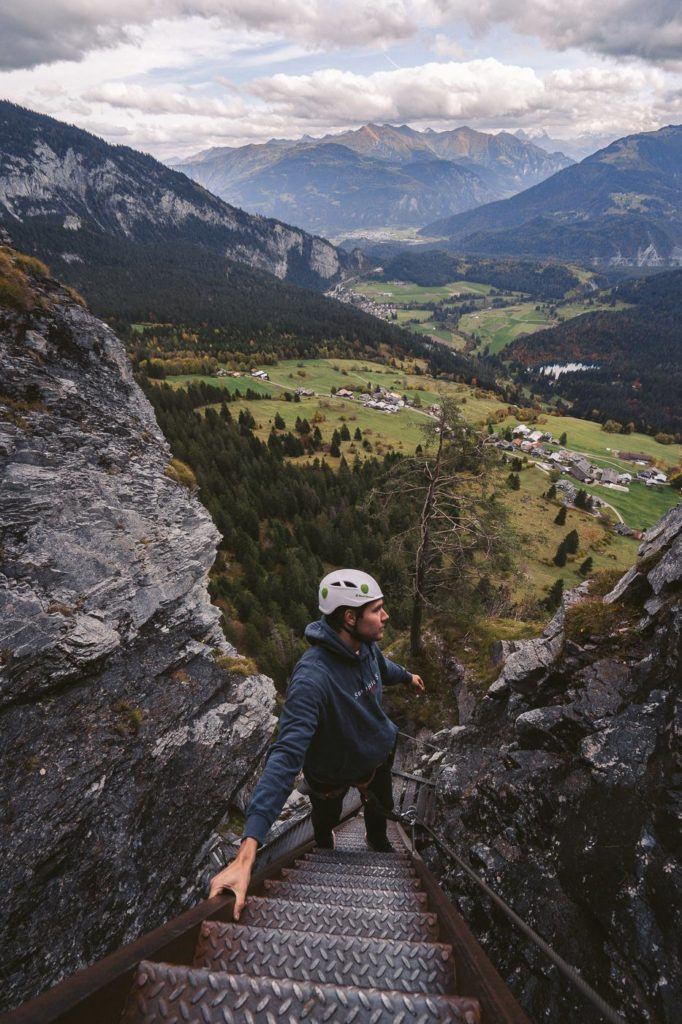
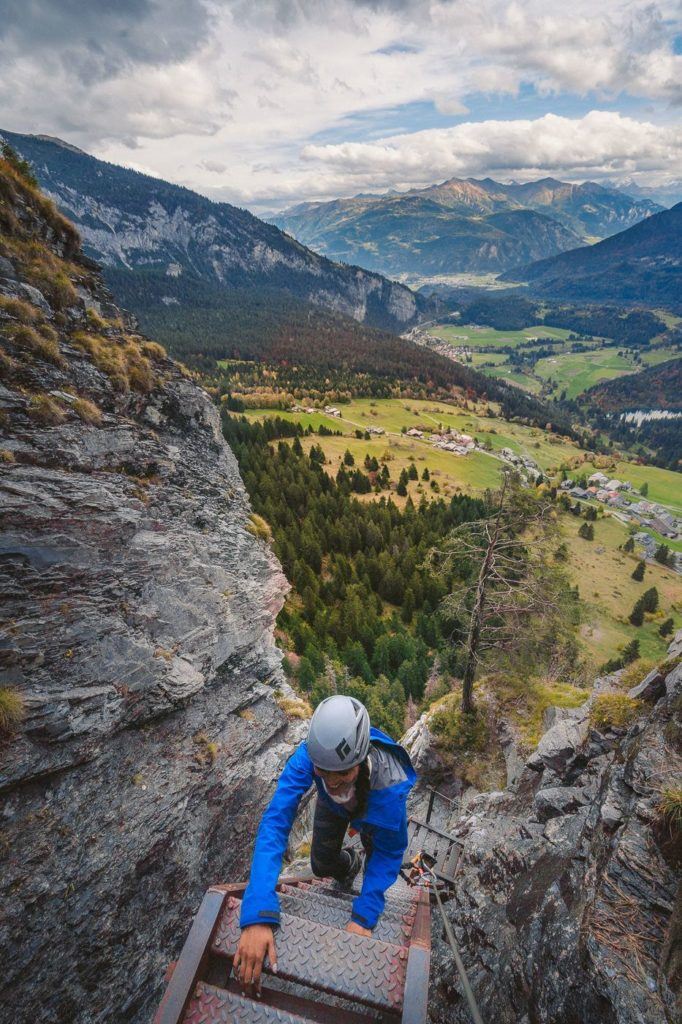
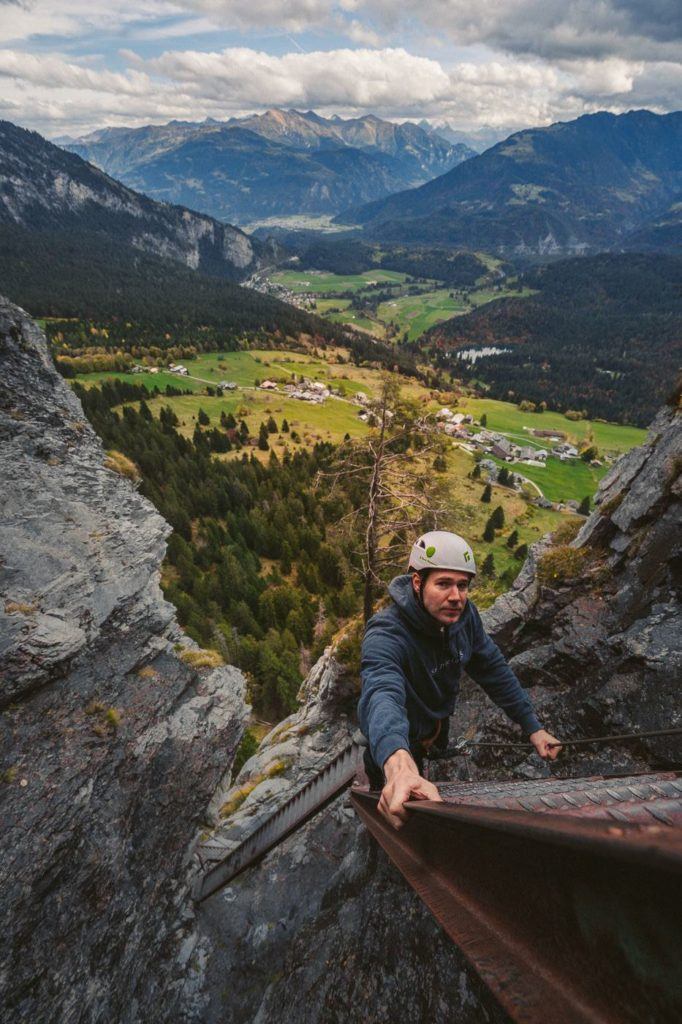

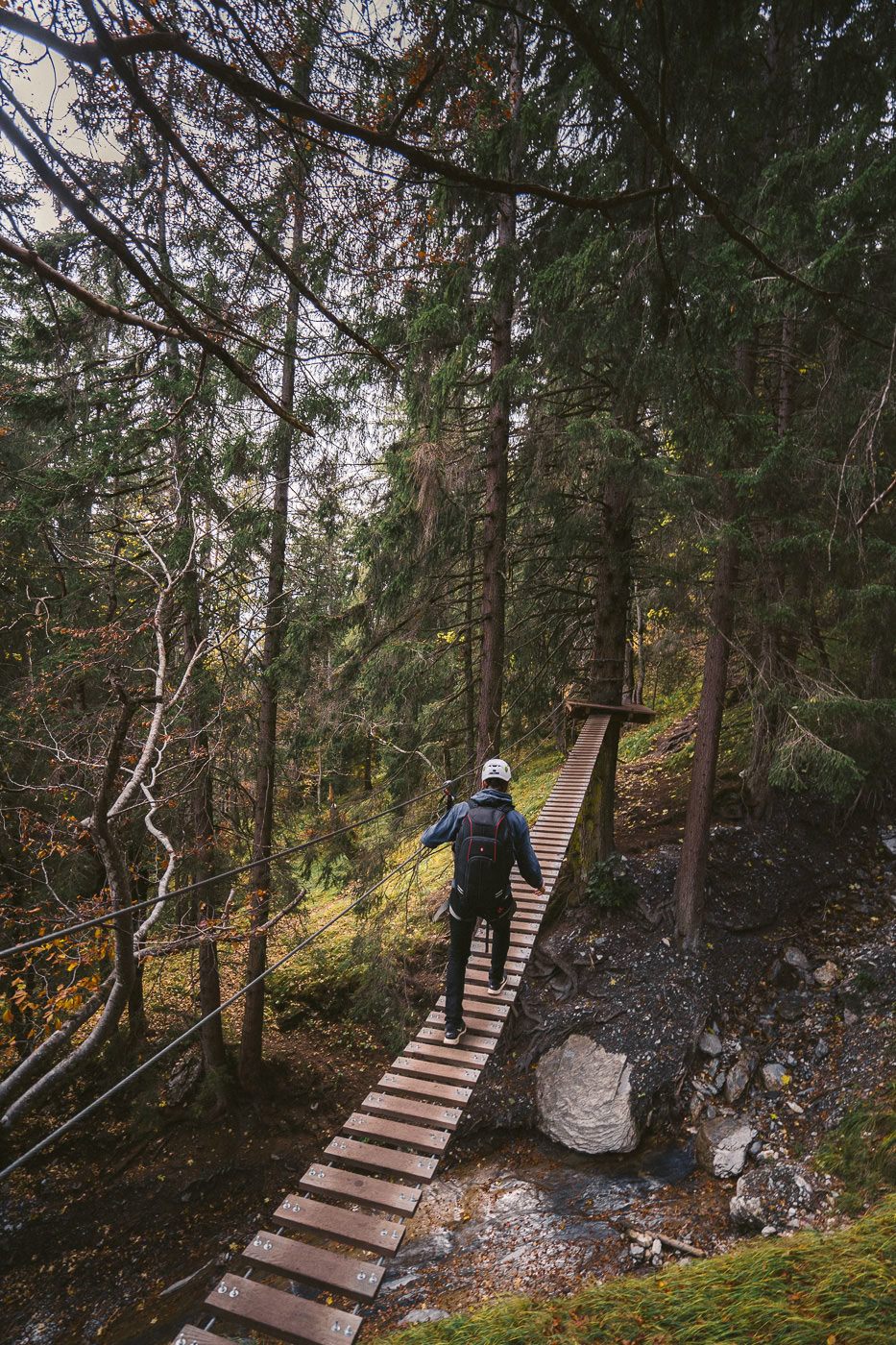
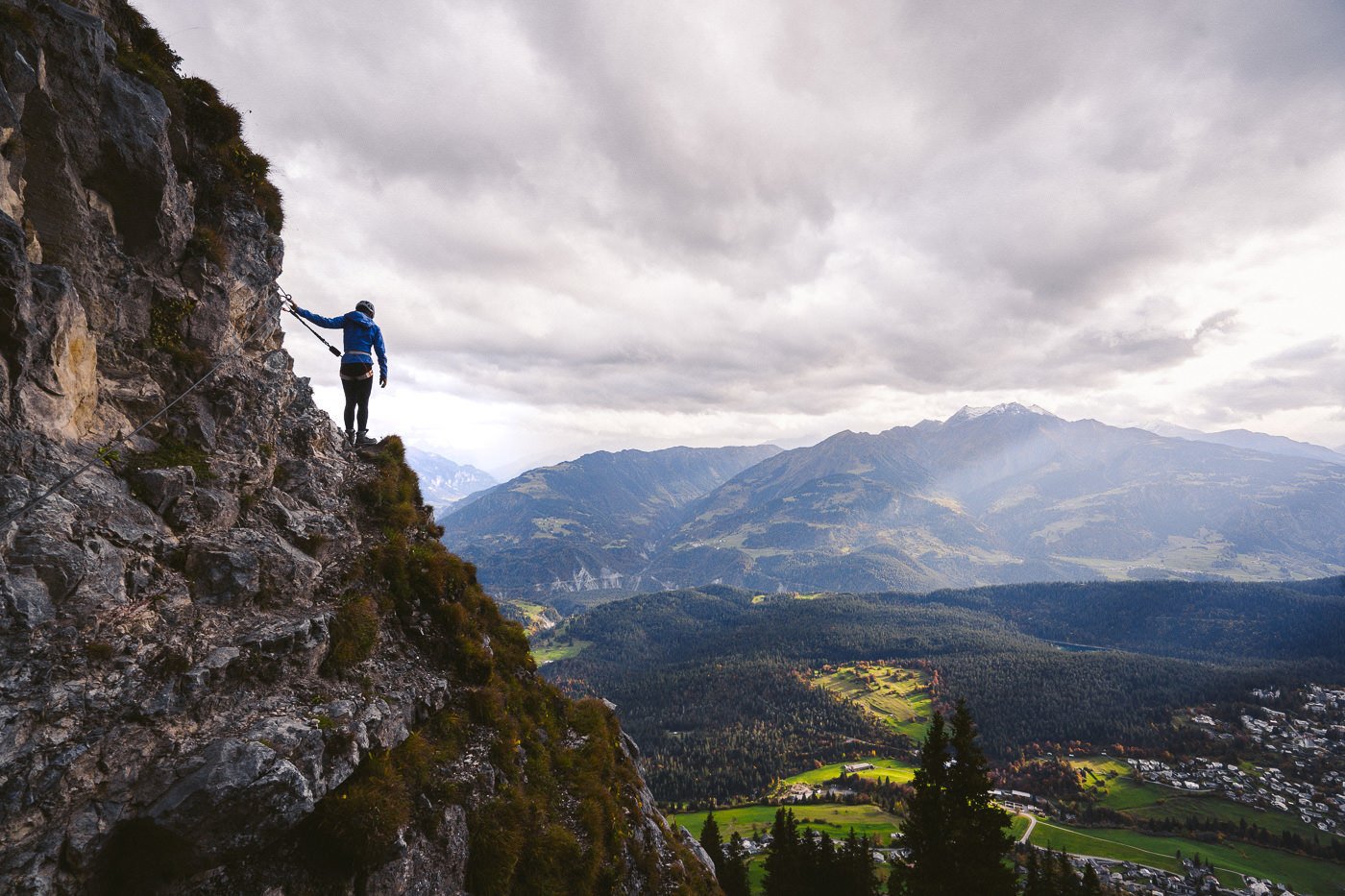
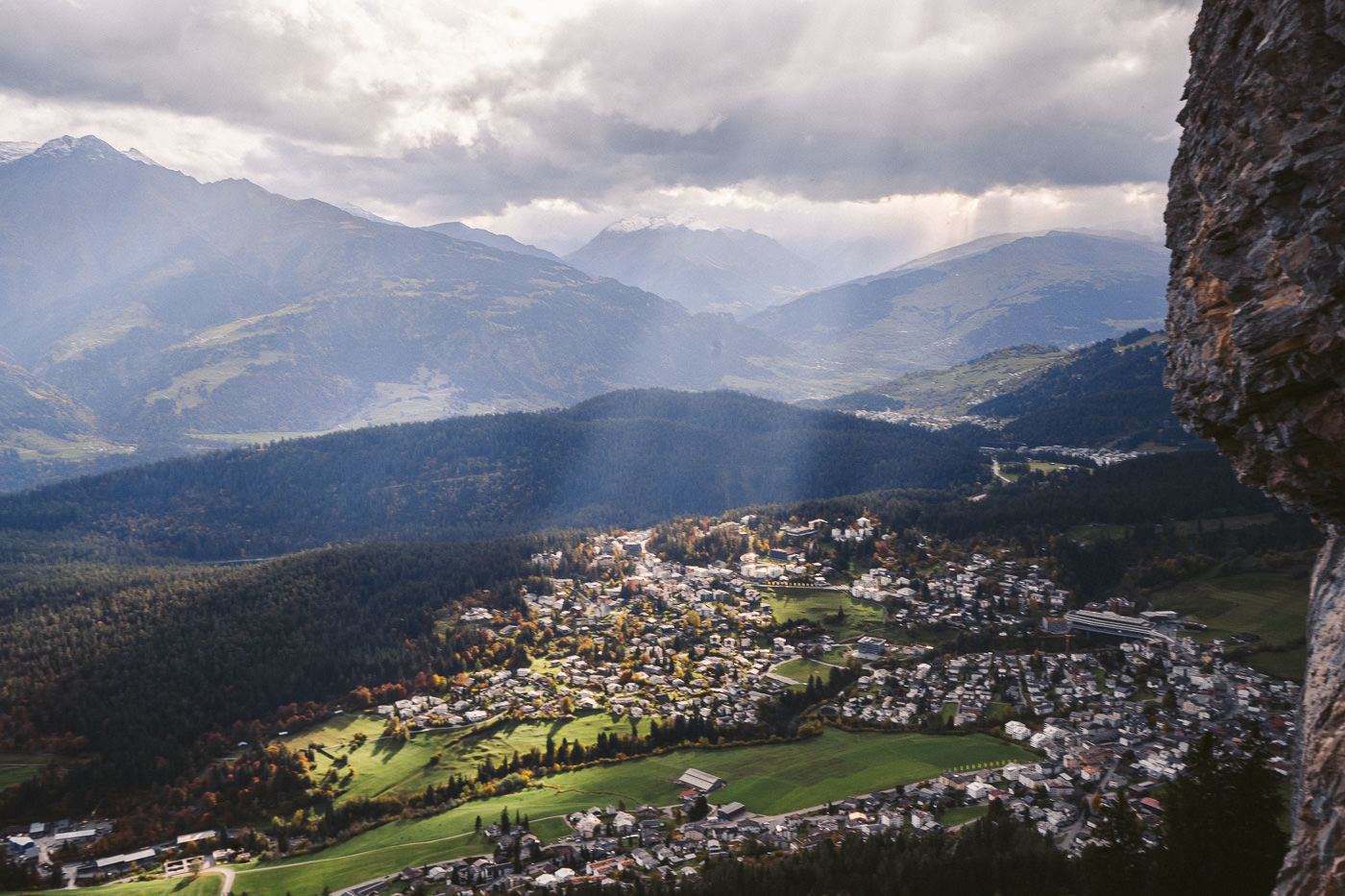

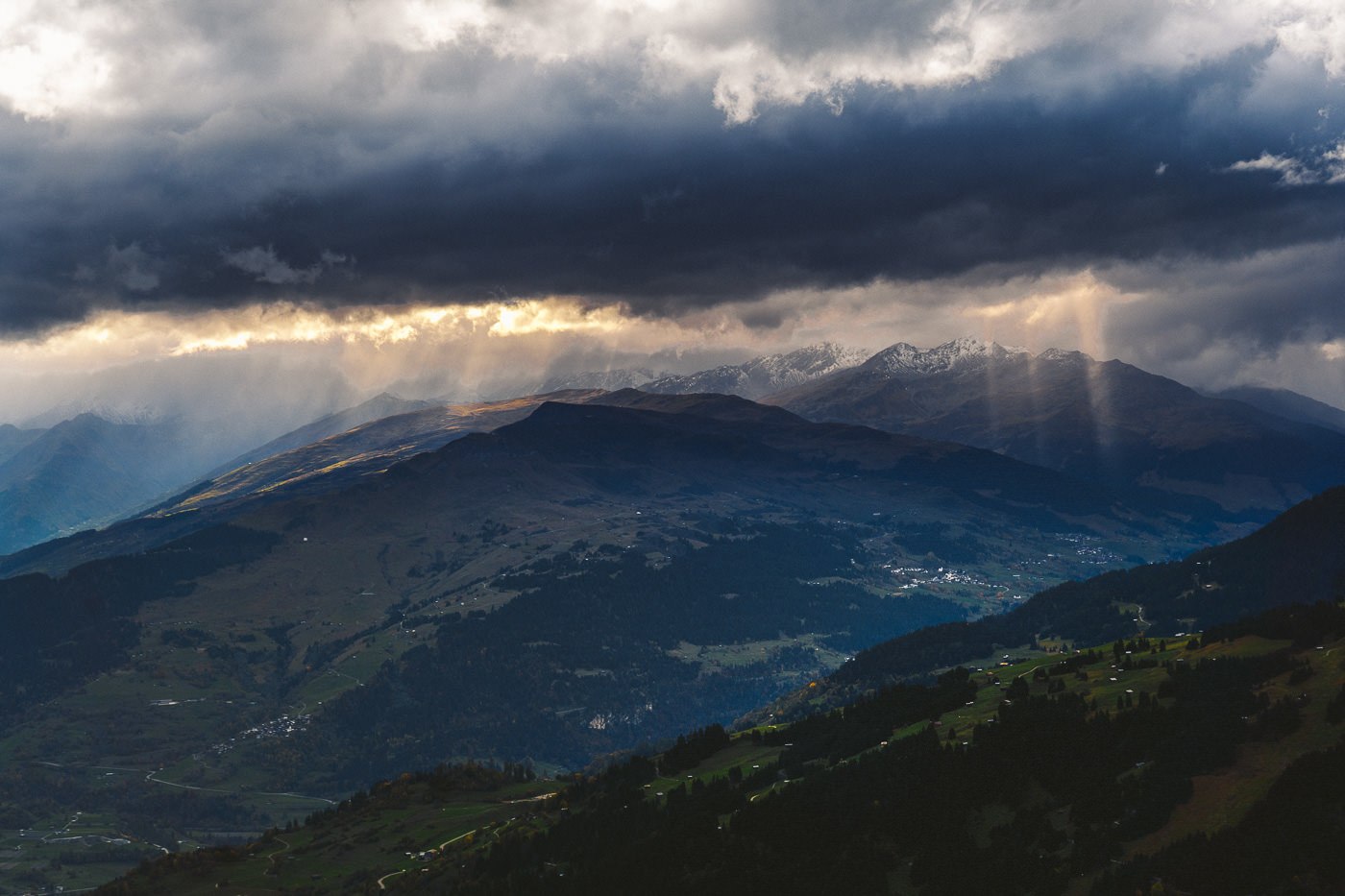
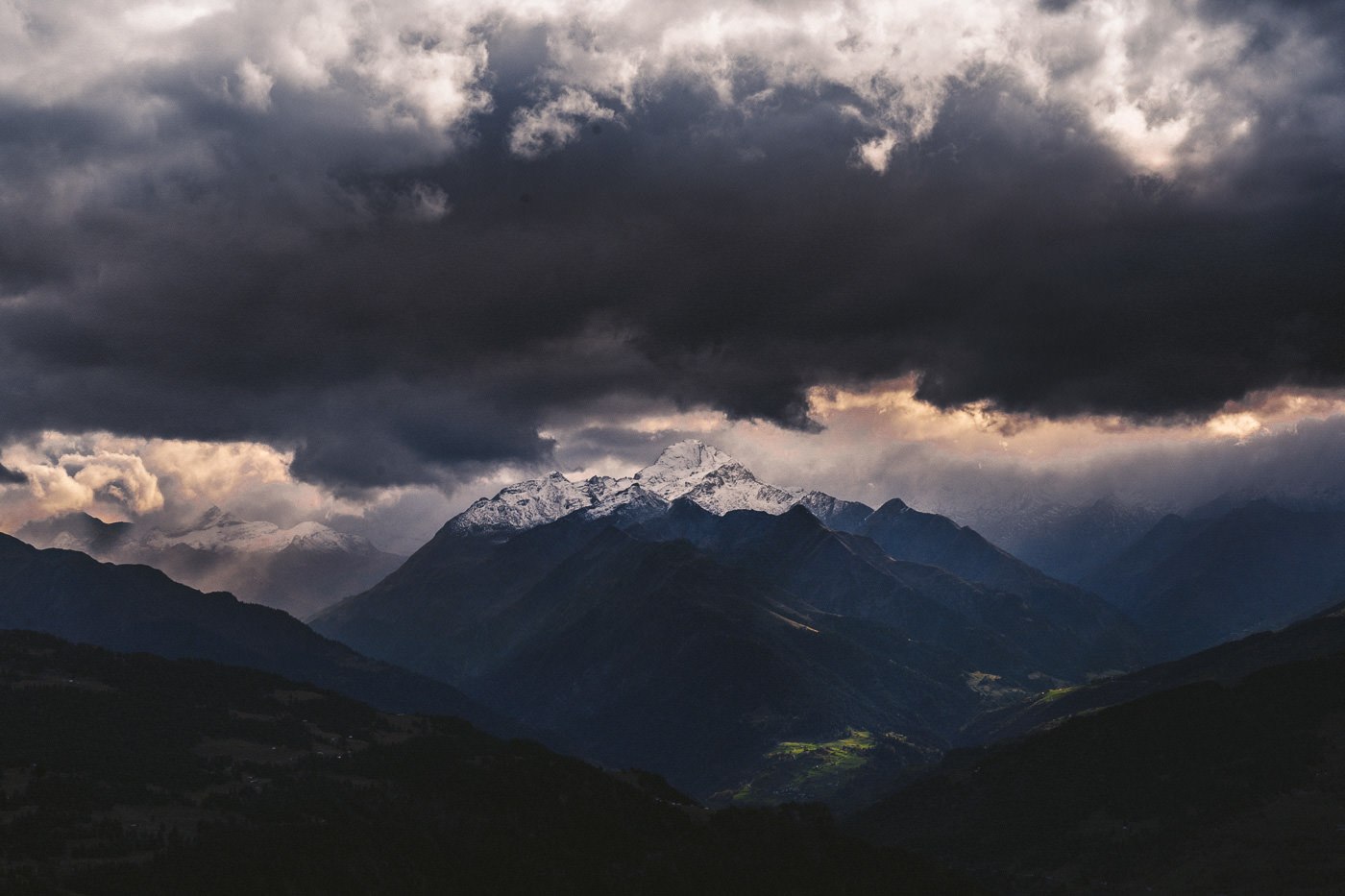
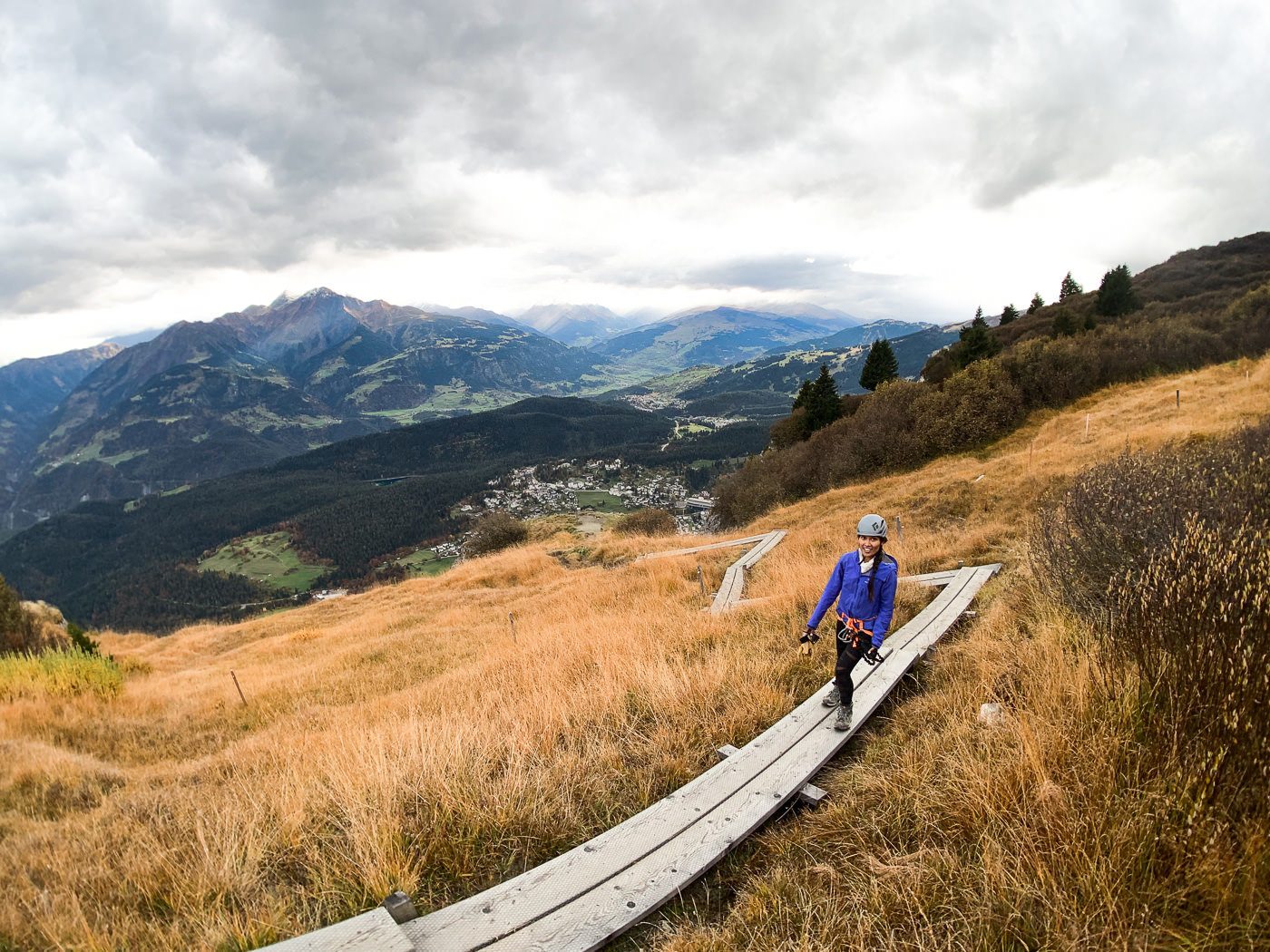
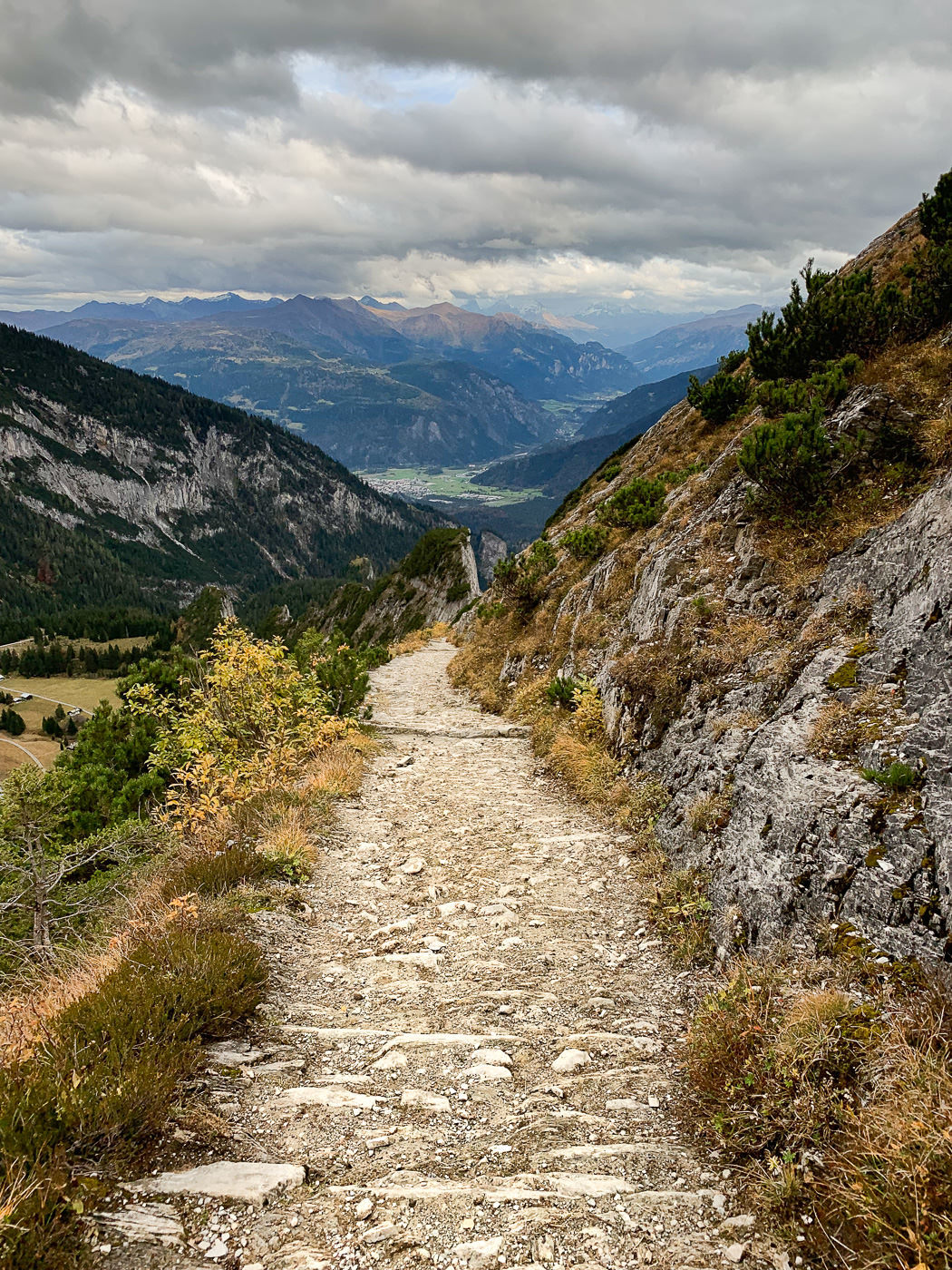
SWISS TRAVEL PASS or HALF-FARE CARD
OPTION 1: Buy the Swiss Half Fare Card: Switzerland trains, buses, and cable cars are EXPENSIVE! I found the best way to get around cheaply was to buy the Swiss Half-Fare Card before I arrived. It gives you 50% off every regular train, bus, and even many cable cars. It only costs $150 USD but pays itself off in just a few days with many train tickets in Switzerland costing close to $100 alone. If you are staying for more than 5 days, I suggest buying the Swiss Half-Fare Card.
OPTION 2: Buy the Swiss Travel Pass: The second option is to get the Swiss Travel Pass, which gives you unlimited train, bus, and (many) cable car rides but it’s pretty expensive at around $100 USD per day so if you don’t travel each day it isn’t worth it.
OPTION 3: Buy the FLEXI Swiss Travel Pass: The final (BEST) option is to get the FLEXI Swiss Travel Pass, which allows you to buy 8 days’ worth of transit but you can choose the night before if you want to activate the next day. That way you don’t need to travel every day to get your money’s worth, you can just activate the FLEXI Swiss Travel Pass on the days when you are doing sizeable transits. My advice is to book the Swiss Half-Fare Card or the FLEXI Swiss Travel Pass in advance before your trip so it’s ready to go when you arrive.
GET A SWISS TRAVEL PASS!
Enjoy UNLIMITED train, boat, and bus rides in Switzerland for up to 15 days. Click to book a flex Swiss Travel Pass or choose the Consecutive Swiss Travel Pass.
The Swiss Travel Pass starts at $260 for 3 days. Click here to check if it’s available on your travel dates.
MY SWITZERLAND HIKING GUIDES
I spent 100 days hiking in Switzerland and created a guide for different regions around the country. You can click on one of my Switzerland hiking guides below to help you plan your trip.
- The Complete Guide: 50 AWESOME HIKES IN IN SWITZERLAND
- The Via Ferrata Guide: 4 EPIC SWITZERLAND VIA FERRATA COURSES
- Lauterbrunnen Guide: 10 AWESOME HIKES NEAR LAUTERBRUNNEN
- Interlaken Guide: 15 AWESOME HIKES IN INTERLAKEN
- Grindelwald Guide: 12 AWESOME HIKES NEAR GRINDELWALD:
- Mürren Guide: 7 AWESOME HIKES IN MURREN
- Appenzell Guide: 9 AWESOME HIKES NEAR APPENZELL
- Chur Guide: 7 AWESOME HIKES NEAR CHUR
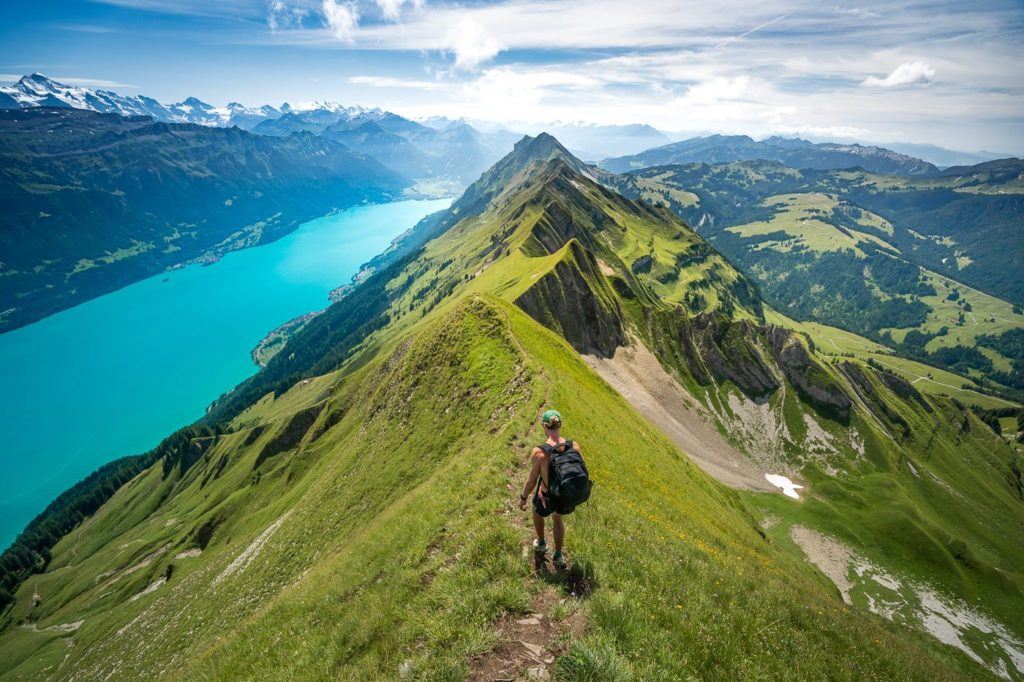
MY SWITZERLAND TRAVEL TIPS
- For Backpackers: SWITZERLAND BUDGET BACKPACKING GUIDE
- Travel Tips: 20 THINGS TO KNOW BEFORE VISITING SWITZERLAND
- Transport Tips: RENTING AND DRIVING A CAR IN SWITZERLAND
- Accommodation Guide: 30 BEST PLACES TO STAY IN SWITZERLAND
